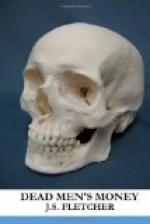Then, with a brief good night, he left me and went into the house, and I got outside Hathercleugh and rode home in a whirl of thoughts. And I’ll confess readily that those thoughts had little to do with what Sir Gilbert Carstairs had last talked about—they were not so much of Phillips, nor of Crone, nor of his suggestion of a possible gang of night-poachers, as about myself and this sudden chance of a great change in my fortunes. For, when all is said and done, we must needs look after ourselves, and when a young man of the age I was then arrived at is asked if he would like to exchange a clerkship of a hundred and twenty a year for a stewardship at more than four times as much—as a permanency—you must agree that his mind will fix itself on what such an exchange means to him, to the exclusion of all other affairs. Five hundred a year to me meant all sorts of fine things—independence, and a house of my own, and, not least by a long way, marriage with Maisie Dunlop. And it was a wonder that I managed to keep cool, and to hold my tongue when I got home—but hold it I did, and to some purpose, and more than once. During the half hour which I managed to get with Maisie last thing that night, she asked me why I was so silent, and, hard though it was to keep from doing so, I let nothing out.
The truth was, Sir Gilbert Carstairs had fascinated me, not only with his grand offer, but with his pleasant, off-hand, companionable manners. He had put me at my ease at once; he had spoken so frankly and with such evident sincerity about his doings on that eventful night, that I accepted every word he said. And—in the little that I had thought of it—I was very ready to accept his theory as to how those two men had come by their deaths—and it was one that was certainly feasible, and worth following up. Some years before, I remembered, something of the same sort had gone on, and had resulted in an affray between salmon-poachers and river-watchers—why should it not have cropped up again? The more I thought of it, the more I felt Sir Gilbert’s suggestion to have reason in it. And in that case all the mystery would be knocked clean out of these affairs—the murder of Phillips, the death of Crone, might prove to be the outcome of some vulgar encounter between them and desperadoes who had subsequently scuttled to safety and were doubtless quaking near at hand, in fear of their misdeeds coming to light; what appeared to be a perfect tangle might be the simplest matter in the world. So I judged—and next morning there came news that seemed to indicate that matters were going to be explained on the lines which Sir Gilbert had suggested.
Chisholm brought that news to our office, just after Mr. Lindsey had come in. He told it to both of us; and from his manner of telling it, we both saw—I, perhaps, not so clearly as Mr. Lindsey—that the police were already at their favourite trick of going for what seemed to them the obvious line of pursuit.




